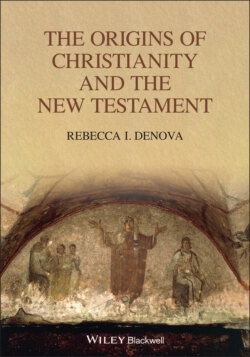Читать книгу The Origins of Christianity and the New Testament - Rebecca I. Denova - Страница 17
Polytheism and Monotheism
ОглавлениеPolytheism (the belief in multiple deities), or sometimes pantheism (the belief in all powers), is always juxtaposed to monotheism (the belief in one god), understood as its polar opposite. However, the terms are problematic because they are modern. No one in the ancient world would identify with being a “polytheist.” More importantly, there was no such concept as “ancient monotheism.” All ancient people were polytheists, including the Jews.
In Western culture, monotheism specifically refers to the God of the Bible – the God of Judaism, Christianity, and Islam. This is demonstrated by the fact that this God is always written with a capital “G.” It designates the God of Israel above all other “gods,” and assumes an element of faith. In the first century, however, the God of Israel was simply one among the many thousands of deities that populated the universe.
Cultures viewed the universe on three levels: the heavens (the abode of the gods); the earth (the abode of humans); and the underworld, often referred to as “the land of the dead.” Gods could “transcend,” or travel around all three. Many groups had the concept of a “high god,” or a “king of the gods,” who ruled over diverse gradients of “powers.” Lower divinities were called daemons, but eventually were seen as evil, and hence the popular word “demon.” Gods as well as demons could “possess” people. In the latter case, this was an ancient explanation of mental health issues and physical disabilities.
Like their neighbors, ancient Jews conceived of a hierarchy of powers in heaven: “sons of God” (Genesis 6), angels, archangels (the messengers from God who communicate God’s will to humans), cherubim, and seraphim. Jews also recognized the existence of demons, with many examples in the ministry of Jesus in the gospels of his role as an exorcist.The foundational story for the idea that Jews were monotheistic is when Moses received the commandments of God on Mt. Sinai: “I am the Lord your God… You shall have no other gods before me.” The Hebrew should be translated as “no other gods beside me.” This does not indicate that other gods do not exist; it is a commandment that the Jews were not to worship any other gods. Worship in the ancient world always meant sacrifices. Jews could pray to angels and other powers in heaven, but they were only to offer sacrifices to the God of Israel.
This command only to offer sacrifices to the God of Israel is one of the major differences between Jews and all other traditional ethnic cults.
The Jewish texts consistently refer to the existence of the gods of the nations (ethnic groups): Deuteronomy 6:14 “do not follow other gods”; 29:18 “to serve the gods of those nations”; 32:43 “Praise O heavens, his people, worship him all you gods!”; Isaiah 36:20 “who among all of the gods of these nations have saved their nations?”; and Psalm 821 “God presides in the great assembly; he renders judgment among the gods.” In the story of the Jews’ Exodus from Egypt, God battles against the gods of Egypt to demonstrate who controls nature. This makes little sense if their existence was not recognized: “…I will bring judgment on all the gods of Egypt” (Exodus 12:12).
While Jews only offered sacrifices to the God of Israel, they shared a common conviction that all the gods should be respected; it was perilous to anger the other gods. Exodus 22:28 ordered the Jews never to revile the gods of the other nations. Early Christians accepted these levels of powers in heaven (and hell), and the Apostle Paul often referred to the existence of the gods of other nations in his letters. He berated them for interfering with his missions.
Throughout this text, we will continue to utilize the capital “G” to distinguish the God of Israel from the other deities throughout the Roman Empire.
